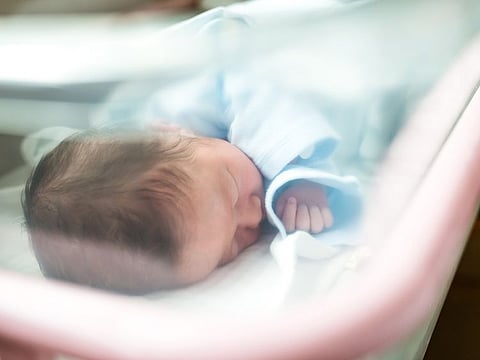701 babies admitted to Latifa Hospital since January
Dubai’s largest NICU has increased its capacity to 64 beds to meet the rising demand

Latifa Hospital for Women and Children revealed that its Neonatal Intensive Care Unit (NICU), which is the largest NICU in Dubai and the Northern Emirates, admitted 701 babies from January to August this year.
In 2019, the unit received 1,058 babies compared to 967 babies in 2018. Of the 1,058 admissions in the NICU last year, 31 per cent (329) were preterm babies, in addition to almost 10 per cent (96 babies) with low birth weight due to intrauterine growth retardation.
Dr Mahmoud Saleh El Halik, Consultant Neonatologist and Head of the Neonatal Intensive Care Unit at Latifa Hospital, revealed that in 2019, the NICU received 11 babies below 500g - adding that the smallest was just 420g.
The hospital performs an average of 4,000 deliveries per year. The NICU has a highly experienced team that provides care and management for extremely premature babies, some weighing as less as 500g, with excellent outcomes.
To cope with the increase in the number of NICU admissions, the hospital’s unit has increased its capacity over the years and today it has 64 beds. It is a referral unit for complicated cases.
International benchmarking
The hospital’s NICU unit is part of the Vermont Oxford Network, an international network of NICUs from more than 1,300 hospitals. The network allows individuals to collaborate on improving neonatal care across the world with data-driven quality improvement and research in neonatal intensive care units of level I, II, & III care centres, against which Latifa Hospital benchmarks itself.
According to the Vermont Oxford Network, the hospital has achieved an 85 per cent breastfeeding rate for neonates which is 15 per cent higher than the international average and a significantly better outcome when benchmarked with several other parameters in the network.
The hospital is also a pioneer in Dubai through its provision of a family room in the hospital’s NICU for extremely premature babies and their mothers. The neonate and mother stay for a few days prior to discharge from hospital to practice bathing, feeding and routine care for the newborn. This increases the mother’s confidence and is especially helpful in complicated cases. All newborns admitted receive involvement from their parents, mainly through teaching kangaroo care for all babies.
Dr El Halik highlighted that there are plans to standardise neonatal care in Dubai through the Dubai Neonatal Network, under the Paediatric service line in Dubai Health Authority (DHA).
The programme was developed by Latifa Hospital neonatologists and is the first of its kind in the region. “The network will retrieve data related to neonatal services in all NICUs in Dubai to help benchmark neonatal services, collect data and offer comparative analysis with opportunities for quality improvement projects in different neonatal intensive care units. Implementation will be through the Health Regulation Sector in DHA.
He said that collecting this data will help enhance neonatal care in all NICU’s in the country.
Dr El Halik said that Latifa Hospital is equipped with the most advanced neonatal ventilation modes and haemodynamic monitoring run by an expert team of neonatologists that ensure a pioneering neonatal care with successful outcomes.



